Reputation management software is designed to monitor users’ online reviews of products and services. It helps spread positive customer experiences through review platforms.
The importance of reputation to businesses can never be stressed enough. Building a good image leads to new customers, increased sales and growth. Reputation management is a taxing undertaking, which led to efforts to automate such process.
In this guide, we will explain in details all the aspects that relate to this software category. Specifically, we will discuss the following key points:
- Features of Reputation Management Software
- Benefits of Reputation Management Software
- Cost of of Reputation Management Software
- Examples of Reputation Management Software
- Potential Issues in Reputation Management
- Trends in Reputation Management
For those of you asking the question, what is reputation management software, companies use this tool as a way to both promote their brands and capture negative customer experience. It can also be utilized to submit reviews via email or ad campaigns. For marketing teams, the platform can serve to interpret their organizations’ online reputation. It is likewise equipped with monitoring tools to capture social media discussions and posts. This in effect, is a short definition of reputation management software.
But how does reputation management software work? As a large majority of consumer depend on reviews when searching for products or services on the Internet, positive reviews are most likely to result in new customers for businesses who get them. In fact, Ambassador reported that 71% of social media users have been found to likely to recommend a company with whom they have positive experience with. Recommendations like these could go a long way as more and more people hear the same story.
Reputation management tools can use these information to increase a company’s sales by giving it insights on how consumers view the business. In the event the software captures a negative review, the company can contact that person and assist him/her in getting a richer experience, which could alter what he/she thinks of the organization. In essence, the software helps not only customers but companies as well, by helping them improve. This answers the question: what is reputation management software?
Proof of this is the fact that it has been found out that 94% of Google search results are organic and not paid advertisements. Aside from this 42% of adults have been found to have searched businesses on the Internet before doing any business with them, 45% of whom have changed their minds due to something they have discovered about the business. This is how important online reputation management is to businesses. It could basically make or break a sale.
What’s even amazing is that 92% of consumers trust reviews posted by other consumers online, more than they trust their friends and families, which have been found to be only at 70%. However, despite these new knowledge, a mere 40% of communication professionals have expressed willingness to protect their companies’ reputation online.
What are the Features of Reputation Management Software?
What does reputation management software do? It has been established that the success of a company’s brand depends largely on how it manages its reputation. It is for this reason that most businesses have been adopting reputation management software to help boost brand image. But what should you look for in such software? The following are the features of reputation management software that you should look for:
- A secure online environment. Corporate teams that access and exchange restricted data online should do so confidently without the threat of privacy breaches. This is why roles, privileges and access must be assigned in a secure setting.
- Collaborative workspace. Large companies require online venues where both their internal teams and external providers can collaborate. Many solutions allow multiple users specifically for managing campaigns.
- Single platform/window. Many reputation management software offer a single dashboard through which users can hand out information. It can also serve as the single destination for information gathered from listening tools, social media and blogs, among others.
- Search and monitoring functionalities. The ideal reputation management tool should be able to track emerging stories and conversations and their corresponding origins. It must also be capable of monitoring social media platforms for stories and generate reports.
- Cost-effective and practical. Conventional methods of monitoring millions of conversations about a single brand is not only tiresome, but very expensive as well. You have to make sure that your tool accomplishes such in a cost effective and practical manner. However, this is not to say that more expensive platforms do better jobs.
- Open architecture. Tool flexibility is a must owing to the fast pace that technology changes and the introduction of new social media platforms. Reputation management tools must have media monitoring capabilities, databases and metrics.
- Real-time notifications. They must be able to deliver notifications in real-time, warning users of customers’ views of their products and services in a timely fashion.
- Packaging. Such tools should be able to convert information into quality and easy-to-understand summaries, which can be used in coming up with productive public relations campaigns.
- Reporting and analysis. Effective reputation management solutions must be able to not only report but measure stories across channels as well.
- Ease of deployment/integration. Hassles associated with the integration of new technologies and solutions must be avoided. On-premise installation should be discouraged.
Benefits of Reputation Management Software
So why use reputation management software? Contrary to popular belief, this product is not just for large companies. It does not matter how big or small your business is, you need to take care of your online reputation. Failing to do so could negatively impact your brand and ultimately, your bottom line. This is apart from the fact that reputation management software can benefit your organization in different ways. Here are some of the advantages of reputation management software:
- Helps in quickly resolving customer complaints
- Helps you show concern over customer service
- Helps in earning customer trust
- Creates positive word-of-mouth about your organization
- Increases transparency
- Identifies business opportunities.
- Aids in growing presence in digital channels.
- Promotes online endorsements
- Aids you in addressing negative reviews and comments
These are but some of the advantages of a reputation management tool. There are more to this platform that your organization can benefit from.
How Much Does Reputation Management Software Cost?
The cost of reputation management software may vary depending on what a company needs. They usually come in monthly or annual subscriptions. Prices could start below $100 and run into hundreds if you want more functionalities. Vendors almost always offer free trials of such software, giving you the opportunity to test their products first before making a commitment. Below are some examples of reputation management software.
Examples of Reputation Management Software
1. Birdeye
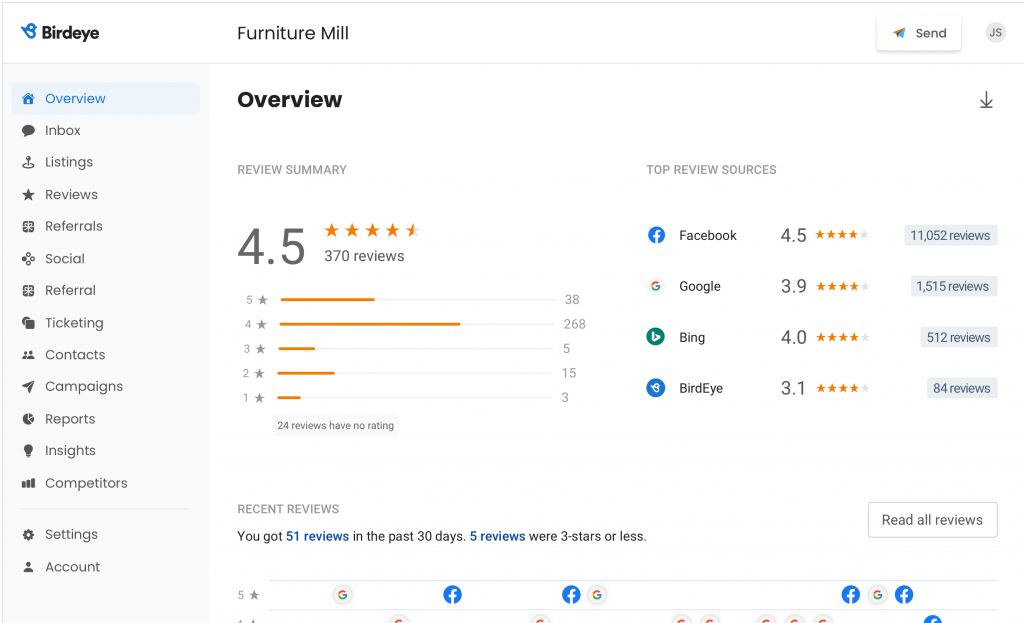
Birdeye is a one-of-a-kind reputation management software that offers comprehensive omnichannel chat support capabilities. It doesn’t just pool reviews from various platforms but also centralizes all engagement opportunities and tickets in a unified mailbox. With this, users can address both customer-reported and potential issues proactively. As such, it has quickly become a go-to solution for many companies, especially local businesses that strive for organic local reputation boosts and improvements. The platform is also very easy to use. It sports a clean interface where you can access all of its features in just a few clicks. Its comprehensive feature set, together with its intuitive interface, affords high out-of-the-box usability.
Key review management features include tools for review generation, monitoring, and marketing. The platform is also known for its intelligence tools. Its powerful AI technology provides users with actionable insights from pooled feedback across different sites. Other intelligence features include social listening and competitor analysis. Birdeye also has social ticketing features. Plus, Birdeye enables users to process customer payments from the platform as well. This makes it a complete reputation management and customer engagement platform rolled into one.
Furthermore, you can extend the capabilities of Birdeye, thanks to its native integrations with other leading third-party solutions. It has more than 3,000 built-in integrations with other tools, including FreshBooks, MoverBase, and QuickBooks Online. Plus, it works seamlessly with Google Services such as Google My Business and Google Knowledge Panel. As such, you have unrestricted access to all the necessary tools to make your business highly visible and reputable on the world’s leading search engines. Lastly, since the product is rolled out according to your requirements, it is only available via quote-based plans.
Detailed Birdeye Review
2. Verified Reviews

Verified Reviews is a powerful third-party review service solution. The product helps companies survey user-generated content across different platforms, from social sites to search engine results. With these, companies can improve their online reputation. The platform aids companies in increasing organic traffic, click-through rates, and conversions. This helps them increase their ROI and improve their SEO performance. The solution is popular among different companies across different industries. Organizational users include brands such as Chairish, Copart, and Lacoste.
Key features include form customization, time-frame customization, certificate creation, moderation area, and email customization. With these, users are enabled to receive real-time data and react accordingly. Moreover, the solution integrates with other third-party tools. Integrations include those for Google, Zendesk, and Yahoo among others. Plus, the platform is also mobile-friendly, so you can access it on mobile devices such as phones and tablets. This way, marketing team members will be able to keep themselves in the loop even when they are out of the office. It also allows companies to immediately deal with issues across different platforms.
Other features include mediation procedure management, SEO improvement, NPS survey, and intelligence tools such as analytics reports. The product is priced according to the number of orders or review requests. Pricing starts at $99 per month.
Detailed Verified Reviews Review
3. Podium
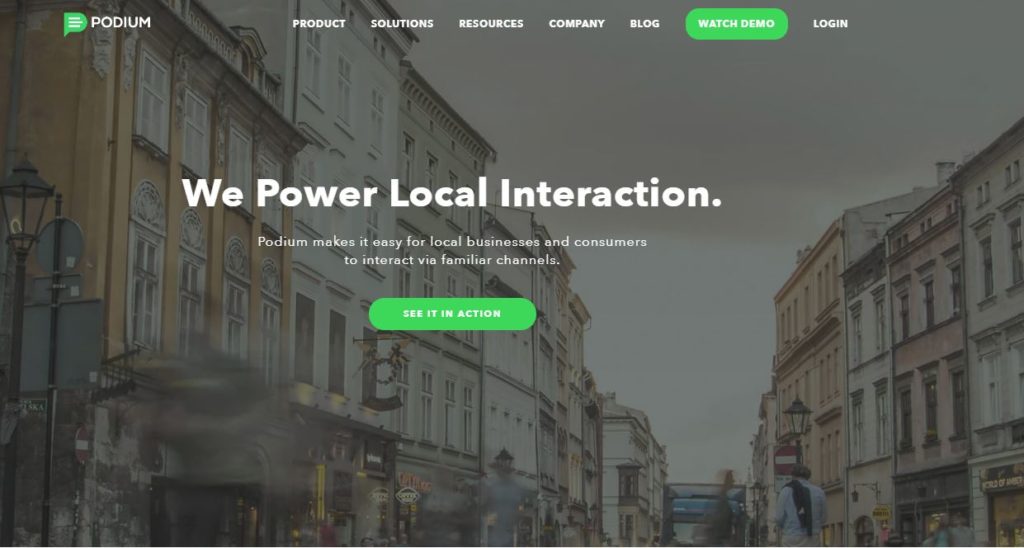
Podium is one of the best reputation management solutions available today. The online review management suite packs robust features for real-time reputation monitoring and interventions. Key features include online review management tools, omnichannel feedback views, operation management features, and customer interaction capabilities. With these tools, companies are able to monitor and manage their online reputations in real time. The platform is designed for local marketing efforts, helping companies improve their reputations at a grassroots level.
Podium also offers productivity and collaboration tools. With these, users can decrease their response rate and save valuable time. Communication tools within the system are also available. These allow marketing and customer support teams to engage reviewers and provide pertinent knowledge within the company. The platform logs interactions and records all reviews and reputation-related data for reference and real-time interventions. The product includes features such as text marketing, webchat, payment management, and a unified inbox.
The software provider has hardware available to help users collect payments efficiently. As well, these are coupled with its reviews management solution. Hence, companies are enabled to give customers a nudge to leave great reviews. The product is rolled out according to your needs. Thus, it is made available via quote-based plans.
Detailed Podium Review
4. Easy Busy Pets
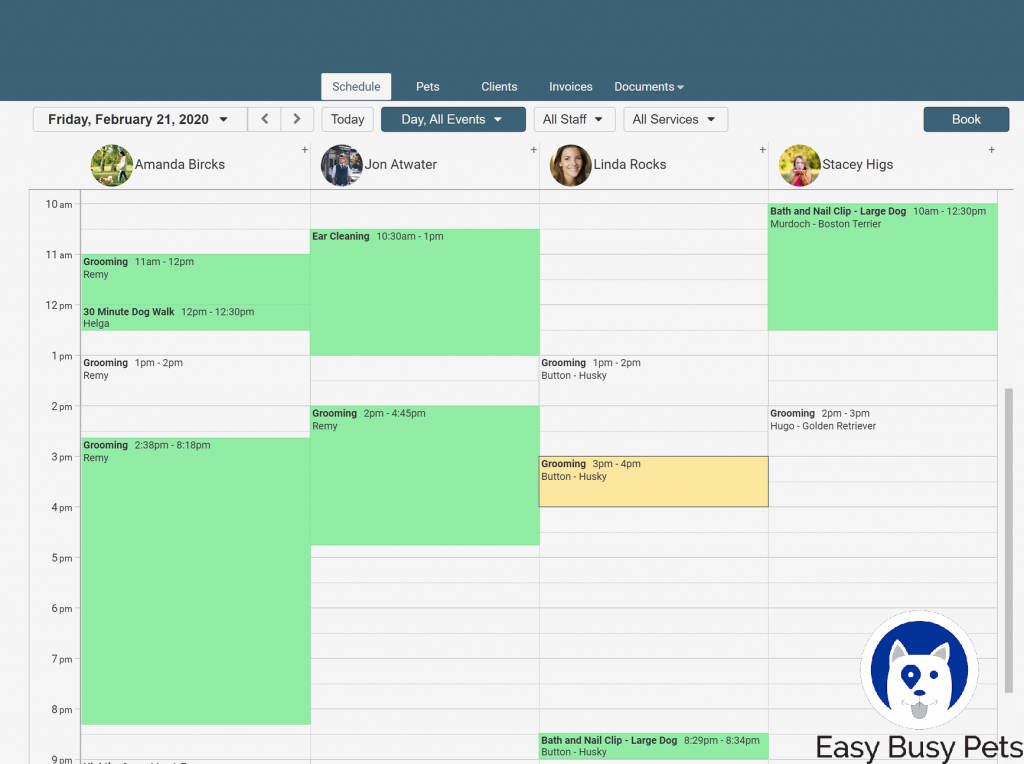
Easy Busy Pets is a specialist reputation management platform for pet care professionals. The platform is an industry-specific solution that helps individual groomers, trainers, and pet shop owners get real-time scores on their online reputation. It provides operations management features such as a web touchpoint builder and an appointment scheduler. It offers a good level of customizability. Hence, businesses and pet care professionals can stay true to their branding. Key features include an automated reviews widget, memberships management, team management, a staff dashboard, and social organic marketing.
Moreover, Easy Busy Pets provides advanced productivity tools on a nice dashboard. With these, team members will always be kept in the loop of all operations in real time. They will get wind of every update, change, and progress thanks to automated notifications. This helps with teamwork and coordination. Other tools include customizable online forms, customer dashboards, and pet dashboards. It also has a GPS check-in/out feature for employees. It has notes and picture submissions to provide context for every job.
Easy Busy Pets allows users to accept payments within the system itself. Hence, they don’t have to move from one app or window to another. It integrates seamlessly with other third-party tools. These include programs such as Twilio and Unsplash. Lastly, it provides very flexible pricing plans. Subscription plans start at $75 per month.
Detailed Easy Busy Pets Review
5. Yotpo
One of the most popular reputation management software around, Yotpo is designed for online sellers and retailers. It has a vast selection of features that are bound to maximize the potential of businesses’ marketing strategies. One such feature is the tool’s ability to generate product reviews, which can have a positive impact on sales.
The software is designed to be a plug-and-play social reviews/e-commerce application, collecting more verified reviews than any platform of its kind. It is capable of improving any organization’s credibility, regardless of size and value. It can be embedded into any platform, where social traffic is seen as most prevalent. Essentially, Yotpo enables businesses to convert visitors into paying customers. Such is accomplished with the use of the documented experiences of past buyers based on social conversations.
The suite is process-driven and helps your organization increase organic traffic and improves the output from paid search ads. It likewise monitors customers that are in a company’s database or those who have increased interest in their products. However, the tool’s function does not end with the purchase, it has customer retention tools that help in making repeat customers. Content sharing is also facilitated through different social media platforms.
Yotpo is one of the lowest-priced tools of its kind. The vendor does not publicly disclose prices and prospects are advised to request for a quote. However, if you want to evaluate the product first, a free trial is available.
Detailed Yotpo Review
6. Qualtrics
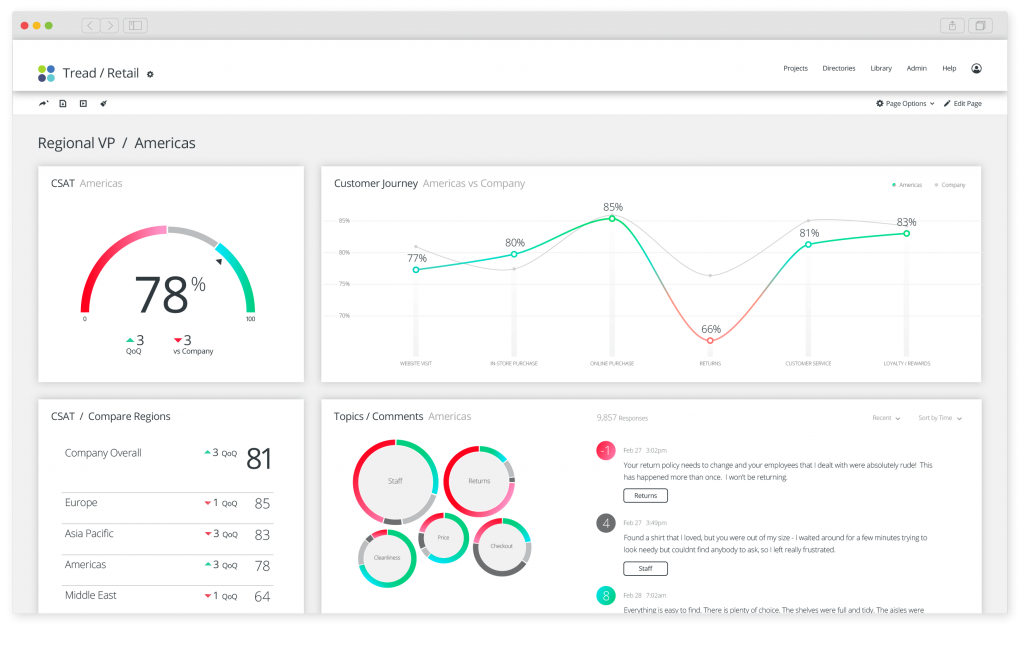
Qualtrics is one of the most popular reputation management software tools available today. The customer experience management suite is designed to gather feedback from all channels. With the platform, users can extract key insights from data to help companies put their best foot forward to achieve business ends. Key features include customizable dashboards, surveys, ticketing management, and an automated respondent management tool. The platform has robust intelligence tools, including text analysis, predictive analysis, statistical analysis, and key driver analysis, among other reporting tools. Its survey management feature allows users to create more than 100 question types and supports open-text responses. Reports have key metrics such as customer effort score (CES), net promoter score (NPS), and customer satisfaction (CSAT).
As with other top tools, the platform provides customizable technology-supported workflows. Moreover, you can access Qualtrics via its native applications on both Android and iOS devices. Thus, you can access all of its features on the go. This allows you to stay up-to-date with all digital touchpoints that affect your business’s reputation. Additionally, you can use Qualtrics within popular software architecture. It integrates with other business solutions such as Marketo, Adobe Analytics, and Zendesk among many others.
Lastly, the platform is rolled out according to your needs. Hence, you can pick and choose the features you want to build your very own reputation management software platform. Being customizable, the product is made available via quote-based plans.
Detailed Qualtrics CX Review
7. Rize Reviews
Rize Reviews is a reputation management software that enables businesses to collect customer feedback and testimonials. It also has the ability to monitor customer satisfaction and come up with positive reviews on different digital channels. These functionalities allow enterprises to boost their credibility, come up with marketing campaigns, and experience growth.
What’s good about the platform is that it allows users to request customer feedback, which can greatly improve brand image. It is likewise able to collect reviews from over a hundred websites, which can be used in a similar manner. With Rize Reviews, you can convert such information into effective sales and marketing tools.
A WordPress plugin and Joomla module allow you to publish reviews on your website. Aggregate review ratings can be embedded, along with a rich-snippet markup. Reviews of your choice can also be published on Facebook and Twitter, allowing for more engagement
The tool is reasonably priced, all you have to do is go to the vendor’s website to request a free quote. A free demo is also available.
Detailed Rize Reviews Review
8. BrandYourself
Online reputation management platform BrandYourself is designed to get rid of unneeded Google results, improving businesses and individuals’ profiles by pushing them up the Google search page. It also helps people and enterprises in coming up with great brands, boosting their reputation.
The tool constantly informs users of their Google search results standing by providing monthly reports and analytics. It also guides users on how to improve their search results. Using the software, businesses can also make sure that their social media profiles get pushed up the search results page, while being assured that search results about their companies only reflect positive reviews and comments.
The tool offers tailored services for both individuals and organizations, helping them create strategies based on Google’s latest algorithms. It also provides a dedicated team of professionals that sees to it that users’ strategies are always optimal.
The solution’s premium package is priced at $99 per year, which comes with all the features and functionalities of the app. A free version is also available but offers limited features.
Detailed BrandYourself Review
9. Percolate
An all-in-one marketing tool, Percolate is popular among marketing service companies the world over. It allows organizations to manage marketing efforts across all channels, offering effective marketing coordination in just about every channel, market and team. All of these are done with the platform’s planning and campaign management functionalities.
Content inspiration, distribution, management, and analysis can also be performed using Percolate’s content marketing and asset management features. Work tracking can be accomplished from start to finish with the solution’s integrated task management system. With the software, you can also publish content from a variety of marketing channels, all from a single dashboard.
Percolate basically helps marketers elevate their content and improve marketing returns. Its marketing analytics feature enables users to measure marketing from conception to execution. Team productivity, cross-channel visibility and content performance insights can be easily tracked using the solution while highlighting areas that could use improvement.
The vendor does not publicly disclose its pricing models. You can go to the company’s website for a price quotation.
Detailed Percolate Review
10. Hootsuite
A social relationship software, Hootsuite enables organizations to come up with social media strategies. The platform boasts of having 10 million users in over 175 countries at the minimum. The best part of the solution is that it allows users to manage multiple social media accounts, all from a single hub, which can be accessed using a single password. This eliminates the need for going to individual social media sites.
The software enables companies to post updates, connect with their client base and review consumer responses on social media platforms including LinkedIn, Foursquare, Facebook and Google+. Users can likewise connect to other platforms using third party applications, which include Vimeo, Instagram, Evernote and MailChimp.
The software supports mobile devices running on Android and iOS. Multi-language support is also available with the app offered in both English and Chinese. It is offered on three pricing schemes–Free, Pro which is priced at $8.99 per month, and Enterprise which requires one to request for a quote.
Detailed Hootsuite Review
Potential Issues with Reputation Management Software
Reputation management software, as useful as it is, also has downsides, which businesses should take into consideration before purchasing one. Among these is the fact that the system may take long to learn how to use, especially for users who are not familiar with technology. In situations like these, live specialists will be the better option. Another setback of the tool is that it hinders personalization of conversations with customers. Mechanical responses and system glitches could adversely affect conversations, whereas live specialists can quickly and effectively resolve customer concerns.
Trends in Reputation Management
Organizations have come to recognize the immense importance of using reputation management tools as evidenced by the increase in the demand for such and similar services being offered by public relations firms.
One area that reputation management software has positively influenced is search engine optimization. Generally, product reviews and articles are the first one to pop up during online searches. This is why companies have been working to convert review sites and links to lead visitors to their digital platforms and positive stories about their brand.



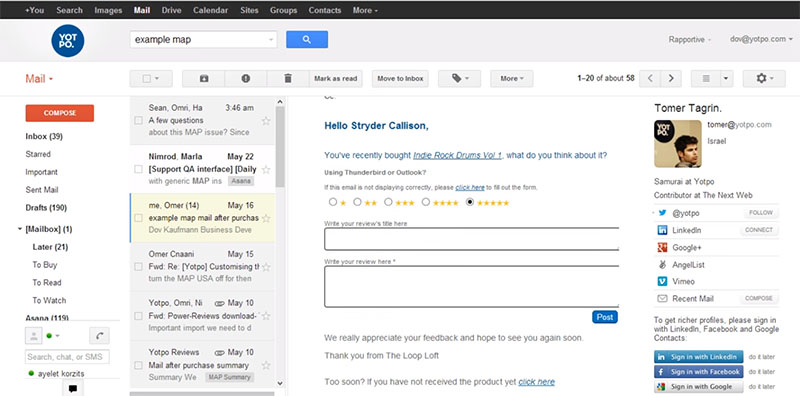

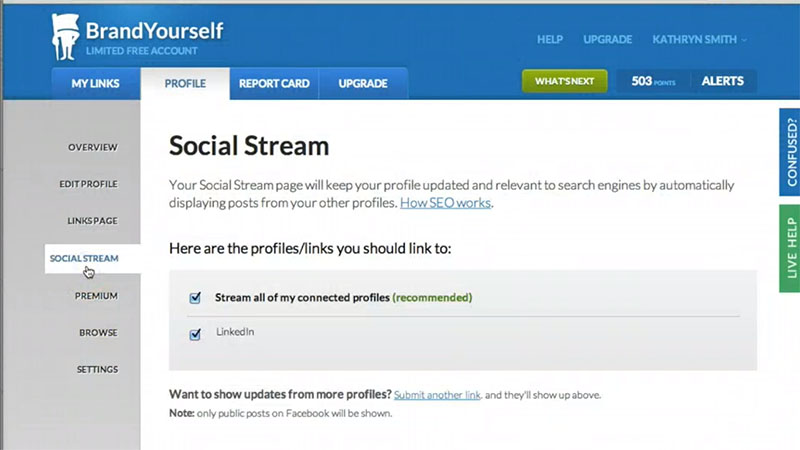
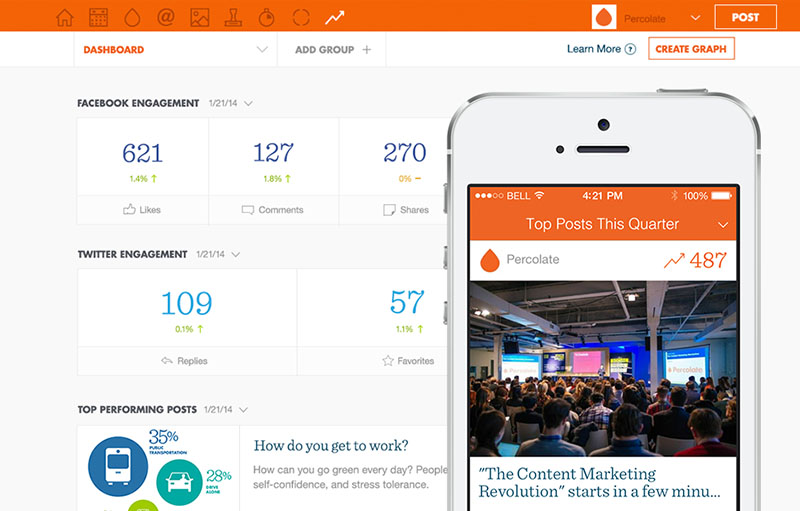

























Leave a comment!